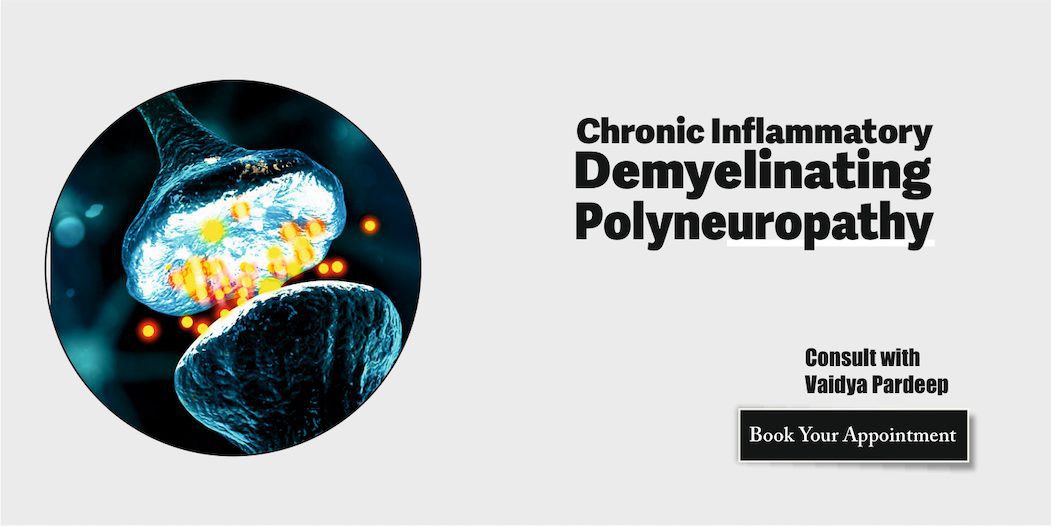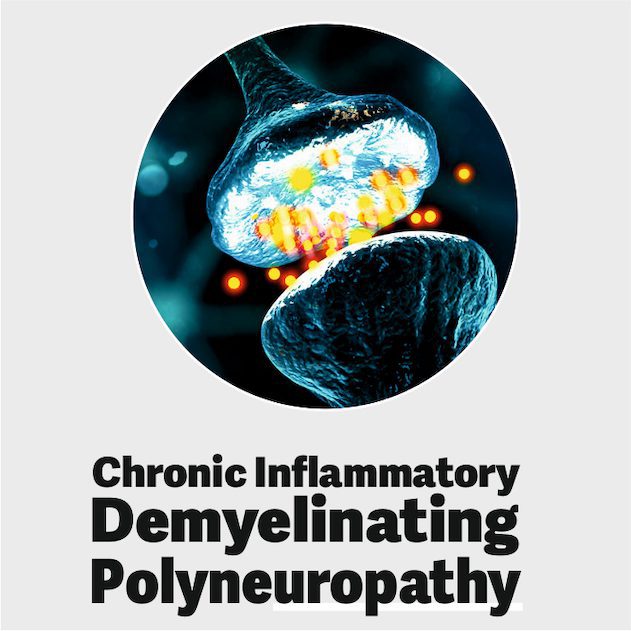Chronic Inflammatory Demyelinating Polyneuropathy: Complicated Neuropathy
Chronic Inflammatory demyelinating polyneuropathy, more commonly known as CIDP or PNS is a progressive neurological disorder that selectively affects the peripheral nerves. It often starts with pain and tingling in one hand or foot but eventually spreads to other areas of the body. Here we will discuss the Ayurvedic cure for Chronic Inflammatory demyelinating polyneuropathy/CIDP.
Though it can affect either side of the body, people tend to have symptoms on their dominant side. The most common initial symptom is-
- Loss of feeling or numbness (known medically as paresthesia) in one area such as an arm, leg, or face
- Weakness
- Difficulty moving limbs smoothly
- Muscle wasting leading to significant limping may occur (myopathy);
- Sensory changes including increased sensitivity to touch (hyperpathia),
- Decreased sensation, and
- Loss of the ability to sense vibrations (hypoesthesia).
CIDP is a rare disorder. There are only about 250 new cases per year in North America. CIDP was first identified as an individual condition separate from other autoimmune neurological diseases such as MS or Guillain-Barré syndrome in 1972. In 2008, researchers discovered that 97% of people with chronic inflammatory demyelinating polyradiculoneuropathy have antibodies against kappa light chains—a type of antibody found primarily in B cells.

What causes this disease: CIPD?
The precise cause of CIDP is unknown. Researchers believe in most cases, the disease results from an auto-immune reaction (the immune system attacking healthy cells). This hypothesis is based on a recent study showing that 97% patients with chronic inflammatory demyelinating polyneuropathy have antibodies against kappa light chains–a type of antibody found primarily in B cells.
Theories about the cause of this auto-immune reaction include:
A genetic predisposition (the tendency to develop a disease because one or both parents had it) A virus that causes CIDP by activating the immune system. This theory is based on studies in animals, which show viruses can activate an autoimmune response against myelin and nerve cells. The herpes simplex virus is capable to trigger inflammation in nerves. Environmental toxins such as mercury, which are present in some fish (not only Ayurvedic medicines alone). People who have certain allergies may also have an increased risk for developing chronic inflammatory demyelinating polyradiculoneuropathy.
What is the difference is neuropathy and CIDP?
Neuropathy is a condition that affects the nerves throughout your body. There are many types of neuropathies, but most involve pain and numbness in the extremities, particularly the hands and feet. Neuropathy is sometimes referred to as peripheral nervous system disease (PNSD).
CIDP stands for chronic inflammatory demyelinating polyneuropathy. It is an autoimmune disorder that affects the nerves in your brain and spinal cord, as well as those throughout your body. Symptoms of CIDP include numbness or tingling in the hands, feet, arms, and legs; muscle weakness; difficulty moving one side of your face (a condition known as Bell’s palsy); trouble swallowing or breathing; impaired sensation to light touch on the skin — such as a feather-light kiss from someone you love—or painful sensations in certain areas of the body.
Neuropathies typically affect one area at a time while chronic inflammatory demyelinating polyneuropathy attacks multiple parts simultaneously. Neuropathies are generally more common than CIDP because it can affect any organ that has a nervous system.
Misdiagnosis of CIPD?
It’s possible for people with other neurological diseases—such as multiple sclerosis (MS) or Guillain-Barré syndrome— to be misdiagnosed with chronic inflammatory demyelinating polyneuropathy. The symptoms of CIDP and MS can be very similar, but they are different diseases that have different treatments.
What are the symptoms of CIDP?
Symptoms usually start with pain, tingling or numbness in one part of the body. The symptoms may then spread to other areas of the body such as arms legs and face. Symptoms can include:
– Pain that is often deep within the nerve – Weakness – Difficulty moving limbs smoothly; muscle wasting leading to significant limping (myopathy)
– Sensory changes including increased sensitivity to touch (hyperpathia), decreased sensation, and loss of ability to sense vibrations (hypoesthesia).
– People who have CIDP might also experience bladder dysfunction because a common symptom is a difficulty holding urine for long periods of time.
– Actually, they don’t need to go urgently or not being able to control when you urinate at all.
– Changes in skin sensation, such as prickling or tingling
– Numbness of the face, feet, and hands.
– CIDP may affect only one side of your body (unilateral) or both sides (bilateral).
– It can be difficult to detect early symptoms because many people with chronic inflammatory demyelinating polyneuropathy have no pain at first. As the disease progresses over time, a person will notice that they are having more difficulty walking without assistance. Muscle weakness is also common but does not always occur immediately like other symptoms do; it typically worsens gradually over weeks or months before becoming noticeable.
CIDP in kids
– In children, this disorder often causes fever and rash (erythema nodosum) before tingling in extremities. These symptoms are not exclusive to CIDP. But can also appear with another autoimmune disorder such as juvenile idiopathic arthritis or lupus. This condition is a rare neurological disease. CIPD primarily affects people between 20 and 50 years old, but there have been cases reported in younger adults aged 16 – 40 years old and older adults age 60+.
What does Ayurveda say about CIDP?
Ayurveda is a system of traditional medicine with origins in India. The theory behind this treatment method is that people have three energies: Vata, Pitta, and Kapha which control bodily functions such as metabolism, body temperature, blood circulation, etc. Ayurvedic doctors believe chronic inflammatory demyelinating polyneuropathy is because of an imbalance among the three doshas (energies).
This condition has been categorized under Prakriti or Dosha-Vikriti meaning it’s not always clear what triggered CIDP.
All cases are different and there isn’t one set cause that causes all types of CIDP so we recommend consulting with Vaidya Dr. Pardeep Sharma.
After consultation, it is possible to comment on the treatment of your condition.
















